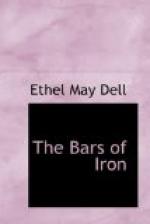“Forgive me, old chap!” he urged. “And understand, if you can. It’s all you can do to help.”
“My dear lad, of course I do!” Instant and reassuring came Crowther’s reply. “If you want my promise, you have it. The business is yours, not mine. I shall never interfere.”
“Thank you—thanks awfully!” Piers said.
He drew a great breath. His hand went through Crowther’s arm.
“That gives me time to think,” he said. “What an infernal tangle this beastly world is! I suppose you think there’s a reason for everything?”
“You’ve heard of gold being tried in the fire,” said Crowther.
Piers broke into his sudden laugh. “I’m not gold, my dear chap, but the tinniest dross that ever was made. Shall we go and have a drink, what? This sort of thing always makes me thirsty.”
It was characteristically abrupt. It ended the matter in a trice. They went together to the hotel buffet, and there Piers quenched his thirst. It was while there that Crowther became aware that his mood had wholly changed. He laughed and joked with the bright-eyed French girl who waited upon them, and seemed loth to depart. Silently, but with a growing anxiety, Crowther watched him. There was certainly nothing forced about his gaiety. It was wildly, recklessly spontaneous; but there was about it a fevered quality that set Crowther almost instinctively on his guard. He did not know, and he had no means of gauging, exactly how deeply the iron had pierced. But that some sort of wound had been inflicted he could not doubt. It might be merely a superficial one, but he feared that it was something more than that. There was a queer, intangible species of mockery in Piers’ attitude, as though he set the whole world at defiance.
And yet he did not look like a man who had been stunned by an unexpected, sledge-hammer blow of Fate. He was keenly, fiercely alive to his surroundings. He seemed to be gibing rather at a blow that had glanced aside. Uneasily Crowther wondered.
It was he who finally suggested a move. It was growing late.
“So it is!” said Piers. “You ought to be turning in if you really mean to make an early start.”
He stood still in the hall and held out his hand. “Good-night, old chap! I’m not going up at present.”
“You’d better,” said Crowther.
“No, I can’t. I couldn’t possibly turn in yet.” He thrust his hand upon Crowther. “Good-night! I shall see you in the morning.”
Crowther took the hand. The hall was deserted. They stood together under a swinging lamp, and by its flaring light Crowther sought to read his companion’s face.
For a moment or two Piers refused to meet his look, then with sudden stubbornness he raised his eyes and stared back. They shone as black and hard as ebony.
“Good-night!” he said again.
Crowther’s level brows were slightly drawn. His hand, square and strong, closed upon Piers’ and held it.




